“[EfM] really opened me up to the fact that God is much bigger than what our preachers, teachers, and others can describe. It helped me see the overabundance of love and mercy and grace that we receive daily.”
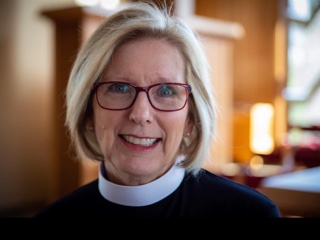
Three framed documents hang in a row on the wall of the Rev. Shari Bishop Harrison’s, T’22, office at Christ Episcopal Church in Albertville, Alabama—her diploma from Sewanee’s School of Theology; a certificate recognizing her ordination to the priesthood in the Episcopal Church; and a confirmation of her graduation from the Education for Ministry (EfM) program. The pieces are arranged vertically, though not chronologically, as Harrison points out. “In order, I would have put the Sewanee certificate in the middle, but I think it looks better with the biggest one in the center.” Even if the timeline is a little skewed, the theme is clear: It’s a picture of Harrison’s journey to ministry—one that would be incomplete without the entire trio of displayed milestones.
Albertville is only about an hour and a half from Sewanee, and Harrison returns to the Mountain regularly as a member of the School of Theology’s Alumni Council. She also stays connected by financially supporting School of Theology scholarships. “I think it’s important that people not be saddled with debt in order to fulfill a call,” she says.
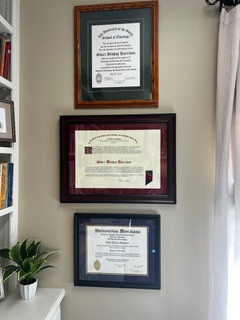
office at Christ Episcopal
Church in Albertville, Alabama
EfM is another important outlet for Harrison’s philanthropy. After graduating from the four-year theological education program in 2016, she immediately trained to become a mentor and guide others through the curriculum. She credits EfM not only as a fulfilling academic experience but also as an enduring source of inspiration and comfort. “[EfM] really opened me up to the fact that God is much bigger than what our preachers, teachers, and others can describe,” she says. “It helped me see the overabundance of love and mercy and grace that we receive daily.”
Growing up in Albertville, the same town where she now serves as a rector, Harrison felt an early call to ministry, but her pathway to the pulpit was uncertain. Her father was a deacon in the Southern Baptist church, which disallows female pastors. “As a Baptist, there wasn’t really a lot I could do,” she says. “I could work for the Southern Baptist Convention in Nashville or write Sunday school lessons, but none of that suited me.” Eventually, her sense of hopelessness became so strong that she stopped attending church altogether. Still, Harrison says, “I never felt a lack of God’s presence. It was always there.”
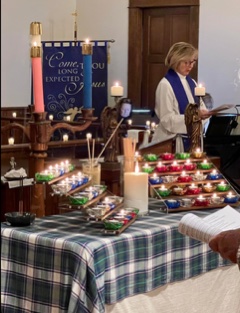
Christ Episcopal Church
In time, Harrison refocused on more achievable career outcomes—she earned a B.S. in accounting and business management from Athens State University and, years later, a master of public administration degree from the University of Oklahoma. During a 20-year career working in finance for the military, she met and married her late husband, Sam Harrison, who was an Army officer. It was Sam, Shari says, who encouraged her to return to the church. “He was very faithful. He grew up Southern Baptist, as well, so we had that in common—although our experiences were completely different.”
Even with her connection to Christianity rekindled, Harrison says she struggled to find her place while attending the Protestant services in the military chapel with her husband. “I would be sitting in church, and something would just come over me, and I’d start crying.” Following Sam’s retirement in 1989, the couple moved to Huntsville, Alabama, and took the opportunity to find a new spiritual home. They visited a Baptist church but decided it wasn’t for them. Undeterred, Harrison decided to do some research. “I bought a book on Christian denominations,” she says. “I honed in on the Episcopal Church from what I read, and, lo and behold, we were renting a house in southeast Huntsville that was a mile from St. Thomas Episcopal Church. I called and made an appointment with the rector, and we sat down with him.” Less than a year after that conversation, Harrison was confirmed in the Episcopal Church by the Rt. Rev. Robert Oran Miller, H’88.
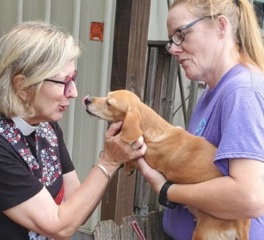
of the animals at a local
no-kill shelter
It would be another two decades before Harrison considered pursuing the divine call that she sensed in her youth. She recalls a moment around 2015 when Sam asked her when she planned to explore priesthood as a vocation. “When someone you’ve lived with for 30-something years says, ‘You need to do this,’ that’s the ultimate affirmation,” she says. “In the end, I finally said yes and moved forward.”
By then, Harrison had retired and was a full-time church volunteer. For six years, she supported the Church of the Epiphany in Guntersville, Alabama, as treasurer, finance ministry chair, and altar guild co-chair, among other roles. As she examined options for following her call, she found that the Diocese of Alabama required graduation from EfM as a step toward becoming a vocational deacon. Coincidentally, the Church of the Epiphany had a thriving EfM program.
Harrison says she initially found EfM’s four-year timetable intimidating but soon discovered that participants didn’t have to commit to completing all years consecutively. After one year of the program, she was hooked. “Early on, I was surprised by how much I needed that aspect of the Christian faith,” she says. “Once you study [theology], you realize that God is much bigger than anything we can imagine.”
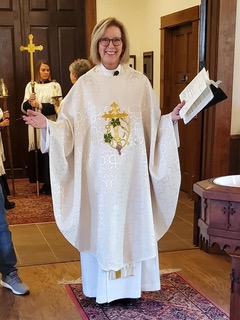
Christ Episcopal Church
EfM was founded in 1975, and Sewanee has always been central to the program’s story. The Rev. Dr. Charles L. Winters, H’07, conceptualized EfM while serving as a professor of systematic theology at the University, and Vice-Chancellor Bob Ayres, C’49, H’74, provided startup resources. From an initial modest presence in Sewanee’s constituent dioceses, EfM expanded quickly, and it now operates internationally, enrolling nearly 5,000 participants each year. Though the program’s curriculum has evolved over the decades, its premise hasn’t changed—ministry is meant for all baptized Christians, both clergy and laypeople. As Harrison describes it, the coursework challenges participants “to look at the world more theologically and to recognize God not only in ourselves but also in others.”
Though EfM is headquartered at the School of Theology, which is affiliated with the Episcopal Church, the program welcomes Christians from all denominations. Harrison says one of her most influential EfM classmates was a Baptist deacon. Each program year focuses on a specific topic—the Old Testament in Year 1, followed by the New Testament; church history; and theology, ethics, and interfaith encounters. The Baptist deacon “has done a lot of things in his life, not the least of which was living and working in Saudi Arabia,” Harrison says. “So, when we studied lessons on living faithfully in a multicultural world, he had much to offer.”
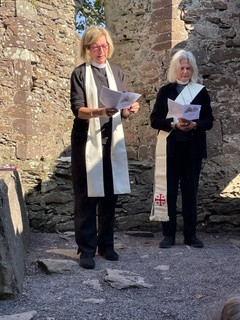
service at Cill Maoilchéadair
in Ireland
In an ideal world, Harrison says, every person with an interest in religion would be able to take part in EfM. “It has made such a difference in my life and my understanding of how we are to live—and how we’re to find our place in God’s world.” Currently, EfM requires a registration fee of $340 per year, and textbooks are an additional cost. Christ Episcopal Church has a small scholarship fund, but Harrison says it’s insufficient to meet demand. “I contribute to EfM because I know how important it is for people to have access to [the program].”
The Rev. Kevin Goodman, who serves as EfM’s executive director, says donor generosity is essential to keep EfM true to its mission and roots. “Charles Winters, EfM’s founder, believed that all baptized Christians should have the opportunity to minister, regardless of their financial means, professional status, or other socioeconomic factors,” he says. “Gifts from the Sewanee and EfM communities are absolutely essential in extending that vision and sustaining EfM’s mission.”
Harrison describes herself as a lifelong learner and says offering theological education to laypeople “is the most important thing we can do [in the church].” She says her time as a seminarian was especially meaningful after years of focusing on career obligations. “When I got to Sewanee, I had nothing else to do but go to chapel, worship, study, and attend class,” she recalls. “It was like a dream.”

